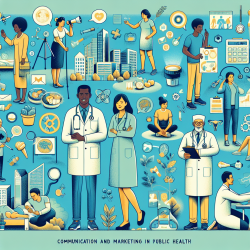Introduction
The COVID-19 pandemic has had a profound impact on mental health, particularly among African American communities. The research article "Coronavirus Trauma and African Americans’ Mental Health: Seizing Opportunities for Transformational Change" highlights the disparities in mental health outcomes and offers strategies for improving mental health care delivery. As practitioners, we have the opportunity to leverage these insights to enhance our services and support the mental well-being of African American children.
Understanding the Impact
The pandemic has disproportionately affected African Americans, resulting in higher rates of illness, death, and psychological distress. This community faces greater personal, social, and financial stress, which exacerbates mental health challenges. The article emphasizes the need for culturally adapted interventions and outreach through trusted community actors to effectively address these disparities.
Implementing Evidence-Based Interventions
Practitioners can improve their skills by integrating evidence-based interventions tailored to the unique needs of African American children. Here are some strategies to consider:
- Culturally Adapted Interventions: Customize therapy approaches to align with the cultural values and experiences of African American children, ensuring relevance and effectiveness.
- Community Engagement: Collaborate with community leaders and institutions to build trust and facilitate access to mental health services.
- Trauma-Informed Care: Recognize and address the impact of trauma on mental health, incorporating strategies that promote resilience and healing.
- Integrated Care Models: Implement team-based approaches that integrate mental health services into primary care settings, improving access and reducing stigma.
Encouraging Further Research
While the article provides valuable insights, it also highlights the need for ongoing research to better understand and address the mental health needs of African American children. Practitioners are encouraged to engage in research activities, such as:
- Participating in Studies: Collaborate with academic institutions and research organizations to contribute to studies focused on mental health disparities and interventions.
- Data Collection and Analysis: Utilize data-driven approaches to assess the effectiveness of interventions and identify areas for improvement.
- Sharing Findings: Disseminate research findings through publications, conferences, and community forums to inform practice and policy.
Conclusion
The COVID-19 pandemic presents an opportunity for transformational change in mental health care delivery for African American children. By implementing culturally adapted interventions, engaging with communities, and conducting further research, practitioners can contribute to improved mental health outcomes and a more equitable system of care.
To read the original research paper, please follow this link: Coronavirus Trauma and African Americans’ Mental Health: Seizing Opportunities for Transformational Change.










